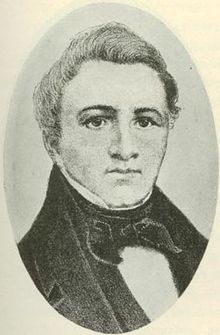Joseph Duncan (politician)
| Joseph Duncan | |
|---|---|
 |
|
| 6th Governor of Illinois | |
|
In office December 3, 1834 – December 7, 1838 |
|
| Lieutenant |
Alexander Jenkins William H. Davidson |
| Preceded by | William Lee D. Ewing |
| Succeeded by | Thomas Carlin |
| Member of the U.S. House of Representatives from Illinois's at-large congressional district | |
|
In office March 4, 1827 – March 3, 1833 |
|
| Preceded by | Daniel Pope Cook |
| Succeeded by | District elections |
| Member of the U.S. House of Representatives from Illinois's 3rd congressional district | |
|
In office March 4, 1833 – September 21, 1834 |
|
| Preceded by | District created |
| Succeeded by | William L. May |
| Member of the Illinois House of Representatives | |
|
In office 1825-1829 |
|
| Member of the Illinois Senate | |
| Personal details | |
| Born |
February 22, 1794 Paris, Kentucky |
| Died | January 15, 1844 (aged 49) Jacksonville, Illinois |
| Political party | Democratic, Whig |
| Profession | Politician |
Joseph Duncan (February 22, 1794 – January 15, 1844) was an Illinois politician. He served as the sixth Governor of Illinois from 1834 to 1838, the only Whig to ever govern the state. Before becoming governor he served four terms in the United States House of Representatives as a Democrat.
Duncan was born in Paris, Kentucky. He served in the War of 1812 and the Black Hawk War as a soldier. He moved to Illinois in the year of its statehood, 1818, settling in Brownsville in Jackson County. He moved to Jacksonville in 1830. Before becoming governor, he had a notable political career. He served a term in the Illinois House of Representatives from 1825 to 1829. He was elected to represent Illinois's At-large congressional district in Congress in 1826, defeating long-term Congressman Daniel Pope Cook. Jacksonian Democrats were ascendant in Illinois politics, and Cook had fallen out of favor with them when he voted against Andrew Jackson in the contingent election of 1825. Duncan successfully ran as a Jacksonian, winning 6,322 votes to Cook's 5,619. He was re-elected twice to the at-large district and in 1832 won a fourth term representing the newly created 3rd district.
...
Wikipedia
